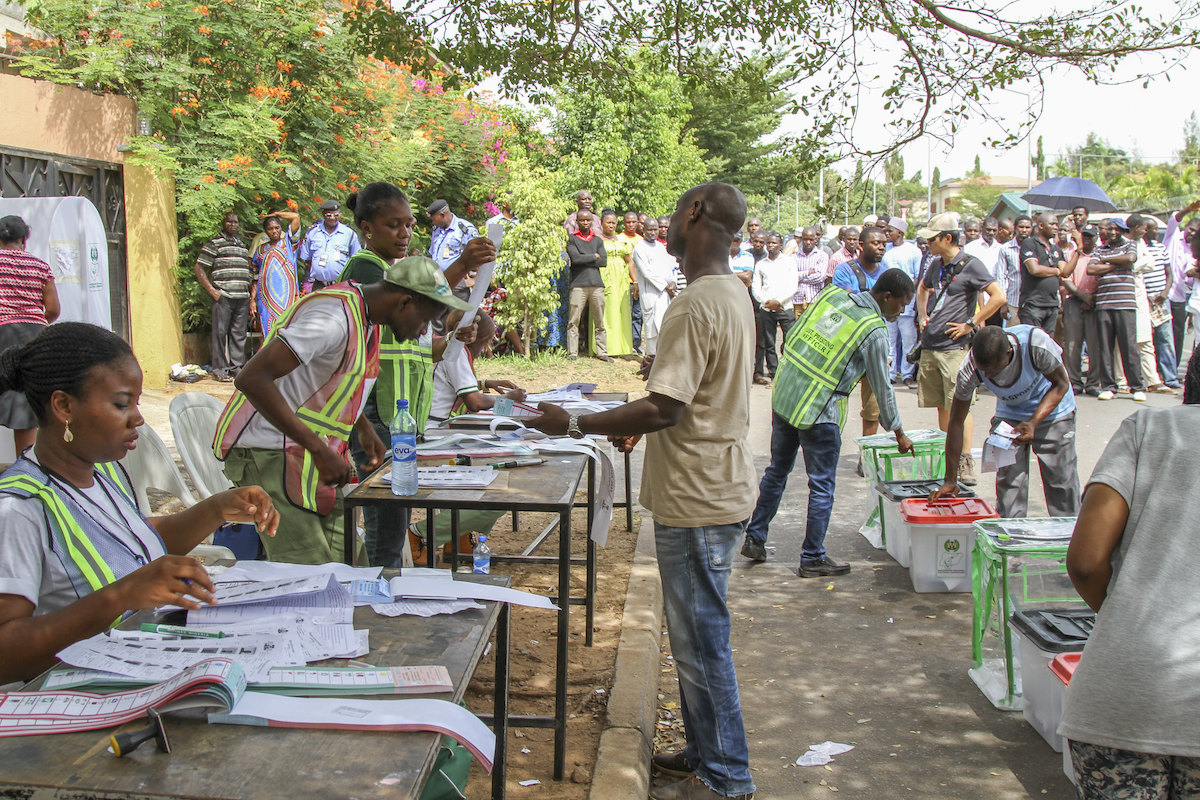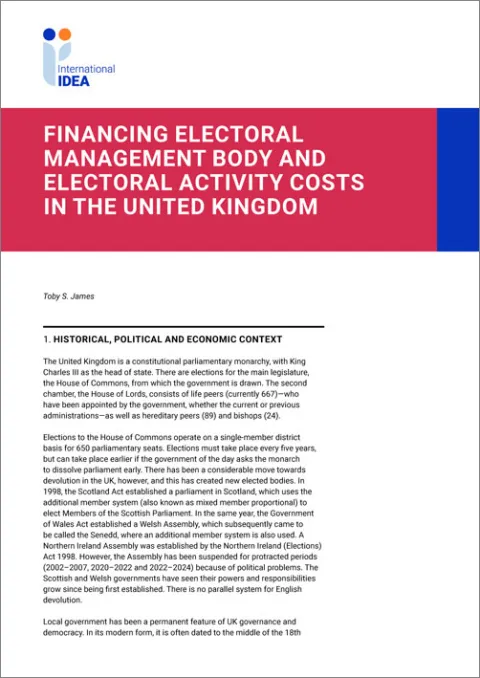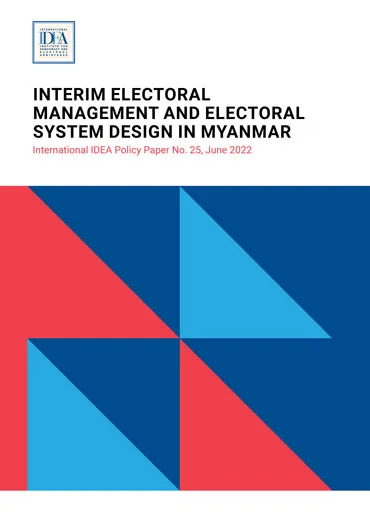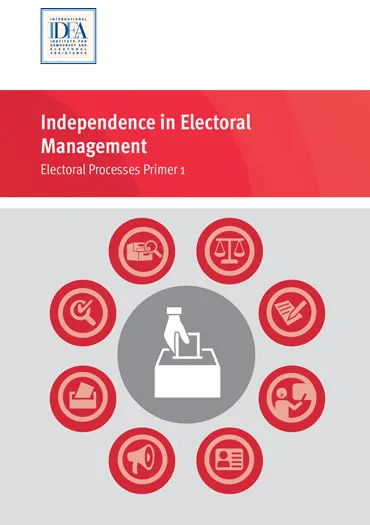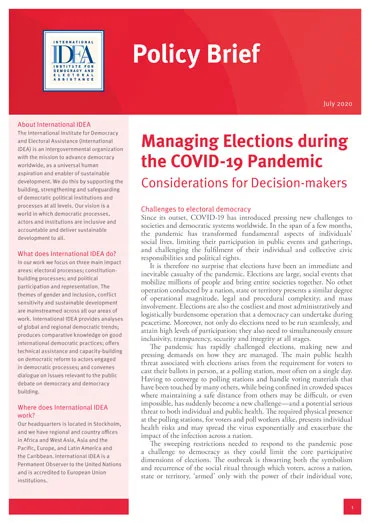| Absentee voting | A mechanism by which voters are enabled to cast a vote which does not involve their attendance at a polling station on the day or days fixed for voting |
|---|
| Amalgamation of results | The incorporation of the votes into a unified result. Also known as tabulation. |
|---|
| Boundary delimitation | The process for determining the way in which constituency or electoral area boundaries are drawn; it deals with the division of a country into electoral districts and the allocation of electors to electoral districts and polling sites. Sometimes called districting or boundary demarcation |
|---|
| Budget (electoral) | A document containing an itemized summary of proposed electoral incomes and expenditures in relation to specified activities by a specified organization or part of an organization, for a defined future period |
|---|
| By-election | An election to fill a vacant seat in an elected assembly held at any time other than at a general election |
|---|
| Calendar (electoral) | A document containing a sequence of tasks and the dates and deadlines for their performance during the planning, implementation and completion of an electoral event |
|---|
| Campaign (electoral) | Political activity, including meetings, rallies, speeches, parades, broadcasts, debates and other media events designed to inform the electorate of or gather support for the platform of a particular candidate or political party in an election or to promote a choice available to voters in a direct democracy instrument |
|---|
| Candidate | A person who is nominated to contest an election either as a political party representative or independent of any political party's support |
|---|
| Candidate nomination | The process by which political parties/organizations and/or individual candidates submit their intention to compete in an election, often subject to meeting qualification criteria set out in the law |
|---|
| Centralized EMB | An organizational structure for an EMB, most often found in countries with unitary constitutions, in which the powers to conduct and implement all aspects of electoral processes at all levels are vested in the national-level EMB |
|---|
| Certification of results | The formal endorsement and confirmation of election results |
|---|
| Chair | The head of an independent EMB under the Independent or Mixed Model of electoral management. Formal titles may include chief electoral commissioner or EMB President |
|---|
| Chief electoral commissioner | See Chair |
|---|
| Chief electoral officer | A title that may be used for the head of an EMB secretariat. Other titles that may be used include chief executive officer, director of elections, secretary-general and EMB Secretary. Where the EMB is independent, the chief electoral officer can in some cases also be a member of the EMB |
|---|
| Civil registry | A centrally held master database containing information generated by the administrative infrastructure of a country involving the mandatory collection of information from many sources and containing information such as the name, gender, nationality, age, marital status and address of all citizens. Electoral registers and other documents may be drawn from it when required |
|---|
| Code of conduct | A set of general rules of behaviour, for example for members and/or staff of an EMB, or for political parties, with respect to participation in an electoral process |
|---|
| Combined EMB | An independent EMB under the Independent or Mixed Model of electoral management some of whose members are non-partisan experts and some of whose members represent political parties or interests. See Expert-based EMB and Multiparty-based EMB |
|---|
| Commissioner | A term used for a member of an electoral commission. Sometimes the term is limited to the EMB chair, and in rare cases the term is used inconsistently to refer to specific senior staff of the secretariat. See Member (of an EMB) |
|---|
| Constituency | A synonym for electoral district used predominantly in some Anglophone countries. See Electoral district |
|---|
| Decentralized EMB | A model of electoral administration in which the powers to conduct and implement different electoral processes and/or different aspects of electoral processes have been delegated by the EMB at national level to sub-national EMBs or sub-national branches of the national EMB |
|---|
| District | Used in this Handbook to mean Electoral district |
|---|
| Domestic observer | An individual or representative of an organization who is authorized and accredited to observe and assess the performance of the election process in her/his own country |
|---|
| Electoral administration | The measures necessary for conducting or implementing any aspect of an electoral process |
|---|
| Electoral administrator | A person who directs, manages and/or implements any of the operations of an EMB on a day-to-day basis |
|---|
| Electoral commission | A title often given to an independent EMB under the Independent Model or to the component independent EMB under the Mixed Model of electoral management |
|---|
| Electoral court | Court of justice or other body before which an electoral actor may dispute the validity of an election, or challenge the conduct of candidates, political parties or the EMB. See also Electoral tribunal |
|---|
| Electoral cycle | The full series of steps involved in the preparation, implementation and evaluation of an election or direct democracy instrument, viewed as one electoral event in a continuing series. In addition to the steps involved in a particular electoral process, it includes pre-electoral activities such as the review of relevant legal and procedural provisions and electoral registration, as well as post-electoral evaluation and/or audit, the maintenance of institutional memory, the process of consultation and the planning of the forthcoming electoral process |
|---|
| Electoral dispute resolution | The process of hearing and adjudication of any complaint, challenge, claim or contest relating to any stage of the electoral process |
|---|
| Electoral district | One of the geographic areas into which a country or region may be divided for electoral purposes. See also Constituency |
|---|
| Electoral management | The process of execution of the activities, tasks and functions of electoral administration |
|---|
| Electoral management body (EMB) | An EMB is an organization or body which has been founded for the sole purpose of, and is legally responsible for, managing some or all of the essential (or core) elements for the conduct of elections, and of direct democracy instruments. These essential (or core) elements include determining who is eligible to vote, receiving and validating the nominations of electoral participants (for elections, political parties and/or candidates), conducting balloting, counting votes, and tabulation of votes |
|---|
| Electoral network (international or regional) | A mechanism, which may be formal or informal, through which EMBs in different countries enable themselves to share knowledge, expertise and/or resources |
|---|
| Electoral register | The list of persons registered as qualified to vote. In some countries known as the voters' list or electoral roll |
|---|
| Electoral tribunal | A judicial or other institution whose specific competence is to hear disputes on electoral matters. In Latin America, such a body is often also an EMB. See also Electoral court |
|---|
| EMB president | In some countries used as the official name of the EMB chair |
|---|
| Expert-based EMB | An independent EMB under the Independent or Mixed Model of electoral management all of whose members are chosen and appointed because of their expertise, reputation or standing in the community. Also referred to as non-partisan EMB |
|---|
| Full-time EMB | An EMB all or most of whose members serve on a full-time basis during their term of office |
|---|
| Governmental Model of electoral management | An electoral management model where elections are organized and managed by the executive branch of government through a ministry, such as the Ministry of the Interior, and/or through local authorities |
|---|
| Independent Model of electoral management | An electoral management model where elections are organized and managed by an EMB which is institutionally independent and autonomous from the executive branch of government, and which has and manages its own budget |
|---|
| Jurisdiction | Refers to the competence and geographic scope of an organization's direction making, decision-making and implementation powers |
|---|
| Liaison ministry | For an independent EMB under the Independent or Mixed Model of electoral management, the government ministry through which the EMB can channel its views and representations to the government, and vice versa |
|---|
| Lower-level EMB | An EMB formed at any sub-national level, for example a province, region, district or commune |
|---|
| Member (of an EMB) | A person appointed or elected to serve on the body or committee which directs the conduct of elections and the implementation of the powers and functions of the EMB |
|---|
| Mixed Model of electoral management | An electoral management model with a dual structure which has a policy, monitoring or supervisory EMB that is independent of the executive branch of government (like an EMB under the Independent Model or Mixed Model of electoral management) and an implementation EMB located within a department of state and/or local government (like an EMB under the Governmental Model of electoral management) |
|---|
| Multiparty-based EMB | An EMB all of whose members are nominated by political parties |
|---|
| National Election Commission | A common title for an independent EMB under the Independent or Mixed Model of electoral management, with competencies over the entire territory of a country |
|---|
| Non-partisan member | An EMB member who has been appointed to the EMB other than as a representative of a political party |
|---|
| Part-time EMB | An EMB all or most of whose members serve on a part-time basis during their term of office |
|---|
| Permanent EMB | An EMB which has a continuous existence throughout the whole electoral cycle and takes care of electoral matters both during and between electoral periods |
|---|
| Political party based EMB | See Multiparty-based EMB |
|---|
| Polling district | An area in which all electors are allocated to vote at a single polling station |
|---|
| Polling official | An member of staff who participates in the administration of a polling station on polling day. Polling officials may or may not be members of the staff of an EMB |
|---|
| Polling station | A venue established for the purpose of polling and controlled by polling officials |
|---|
| Pre-electoral period | One of three periods of the electoral cycle, during which planning and preparation for the conduct of elections take place, and during which legal and procedural provisions are reviewed |
|---|
| Regional EMB | An electoral management body at a sub-national level |
|---|
| Registration of political parties and candidates | The act of accepting the applications to participate in an election of political parties and candidates that meet defined criteria |
|---|
| Registration of voters | The act of entering the names of eligible electors and other relevant information in a register or list of electors |
|---|
| Single-member district | An electoral district from which only one member is elected to a legislature or elected body |
|---|
| Single-member EMB | An EMB where the powers and responsibilities for implementing the mandate of the EMB are vested by the legal framework in a single person |
|---|
| Staggered membership | A system under which members of an EMB are not all appointed at the same time and their terms of office do not end at the same time, usually used to ensure continuity in the work of an EMB |
|---|
| Subsidiary EMB | An EMB that is not the primary or principal entity responsible for the organization of elections within a country, and that assists the primary EMB and implements electoral tasks at local and regional levels |
|---|
| Tabulation | The process of compiling the result of counting of votes cast in an electoral process. Also known as amalgamation of results |
|---|
| Temporary EMB | An EMB which exists only for a specified limited period, often for the electoral period |
|---|
| Term of office | The period of time for which a member of an organization serves following election or appointment |
|---|
| Transitional EMB | An EMB which is set up temporarily to facilitate transitional elections. It is normally set up under the auspices of the international community, such as the UN, and may consist of or include international experts as members |
|---|
| Voter information | A short-term programme focusing on specific electoral information, which aims to give relevant factual information about an electoral process to voters on a timely basis |
|---|
| Voter registration card | A card issued to identify a person registered as an elector in accordance with the provisions of the electoral law |
|---|
| Voters' list | See Electoral register |
|---|

